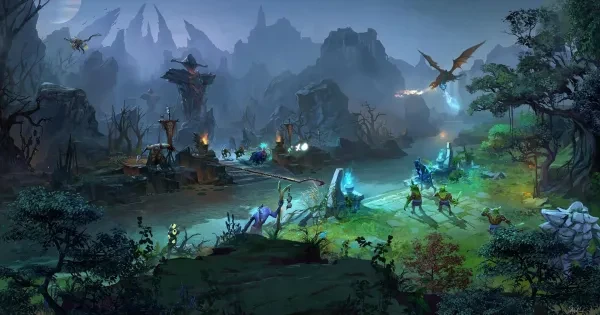Wonder Interactive’s The Immersive Web will play Unreal 4 games on the web
[ad_1]
Did you miss a session from GamesBeat Summit 2022? All sessions are available to stream now. Learn more.
Alex St. Louis, the founder of Wonder Interactive, has always dreamed of enabling high-end games like those built with the Unreal engine to run on the open web. And his company has built the platform to make it happen, and he calls it The Immersive Web.
St. Louis believes his company is an infrastructure firm that is going to provide the onramp to the metaverse, the universe of virtual worlds that are all interconnected, like in novels such as Snow Crash and Ready Player One. But first things first. St. Louis wants to get Unreal Engine 4 games, and eventually Unreal Engine 5 games, to run on the web.
This kind of technology is important, as platforms, and game developers have been squaring off in a bid for power over the $200 billion game industry. Epic Games sued Apple and Google to escape from the 30% royalty rates on the app stores. Valve decided to disallow blockchain games on its Steam platform, irking numerous NFT game companies. St. Louis believes the open web is key to bypassing the closed platforms.
But in the past, only crappy games seemed to run on the web. Apple has done little to modernize Safari’s ability to run high-end games, as that would hurt its app store revenues. Google’s Chrome is pretty advanced, but St. Louis believes the technology is at hand to run much higher quality graphics on the web.
“We want developers to be able to ship an application or game on the the open web and be able to establish very importantly a direct relationship online with their users,” said St. Louis.
Wonder Interactive is building a platform and suite of tools to enable any developer to bring their game or real-time 3D app to the browser, with a focus on Epic Games’ Unreal Engine 4. And to make the metaverse more interoperable, the company is working on tools and protocols to enable things like a player jumping from Unreal web worlds like Fortnite to a Unity web world like Decentraland, then to the Sandbox, then to Minecraft, etc.

By beefing up the web and turning it into the spatial internet, St. Louis hopes to enable the open metaverse. In contrast to incumbents and new entrants who want to develop a closed ecosystem, he wants it all to be seamless and interoperable.
“We aren’t developing a closed ecosystem that forces creators to distribute their games and apps as native binaries through closed ecosystems and storefronts,” he said. “We’re on a mission to break down the walled gardens and enable developers to deploy their games and real-time 3D applications directly online to their users via the browser.”
His tools are WebAssembly, WebGPU, and WebXR technologies. These have been clunky in the past, but Wonder Interactive is bringing support for HTML5 back into Unreal Engine, with upgraded support for developers to deploy their games and real-time 3D apps to the browser at near native performance.
Traditionally, Unreal has had the poorest support out of all the engines for deploying to the web. Epic Games did originally support exporting to the browser, however this only had support for the WebGL 1.0 backend; developers were thus not incentivized to use it due to the poor user experience. Epic officially removed support as of the 4.23 release of the engine.
“We have since added support for WebGL 2.0 to later releases of Unreal Engine 4 up to 4.27. We are actively working on integrating WebGPU into both UE4 and UE5 to enable higher fidelity games and 3D applications that can fully tap into modern client hardware,” St. Louis said. “We’ve also developed a complete (software development kit) SDK and suite of tools that enables highly optimized binaries and fast startup speed.”
The company provides hosting and a dashboard for developers to manage, provision, and update their builds. The team is currently focused on Unreal Engine support, followed by support for other game engines like Unity, Open 3D Engine, Godot, custom game engines, and more in the future.
“We are also going to offer WebXR compatibility for all of these engines as well, so developers can ship cross-platform VR applications across any headset that are available through VR web browsers,” St. Louis said. “As we run on top of an edge computing network, we have a global reach with fast startup times.”
How it started

Based in Edmonton, Canada, St. Louis began using the Unreal Engine and he started investigating how he could essentially ship a game that could reach a wide variety of platforms and quite a wide user base.
“I’ve always been personally a huge fan of browser games. Browser games, honestly, were my entry into the gaming industry, as I played games like Runescape games and Club Penguin in the school computer lab,” St. Louis said. “It was just so low friction to be able to click a link and instantly be transported into a game, not having to worry about launcher. So I’ve always had a very good association and positive experience with web games.”
With Unreal Engine, he was trying to bring a first person shooter game to the web.
“And I stumbled across the WebGL technology. And I started looking into whether the native game engines could actually support the web,” he said. “And, to my dismay, around the same time Epic Games was actually deprecating support for exporting to HTML5.”
He thought of this as a mistake by Epic Games. He started doing research into how he could resurrect support for this, as its rival Unity has had excellent WebGL support for many years now.
“Many developers have been able to ship high fidelity games on the web that rival anything on the app stores or on Steam,” St. Louis said.
He started asking about it on Reddit, and he met his cofounder Robert Stewart, who is chief technology officer for Wonder Interactive.
“We put our heads together and started our company Wonder Interactive. We’re working on a suite of developer tools and a platform to enable developers to seamlessly distribute and deploy their games in real-time 3D applications to the browser, no need for walled gardens, no need for 30% cuts,” he said. “All they need is like a web server. They need our tools. And if they want to self host, they can do so. Or they can utilize our discovery platform.”
How it works

“Exporting to the web traditionally hasn’t been something developers have really taken super seriously,” he said. “Users don’t want to wait for anything to load.”
The company has made tools for asynchronous asset fetching or an asset streaming system that enables dynamic loading in and out of assets at runtime, using only what’s absolutely necessary, he said.
“If you have a game that’s 350 megabytes and it’s an open world MMORPG metaverse type game, and you want to quickly get the user in with as little friction as possible, the menu might be less than 10 megabytes,” he said. “The initial lobby and play areas you start in might be another 20 to 30 megabytes. You might have a total download there of 40 megabytes. And that’s the pre-compression rate. So that 40 megabytes can actually be split up into smaller parts, which is what we’ve done. And that’s really reflective of what modern game engines can do, especially like Unreal Engine 5, the ability to grab lots of data, and serve what’s only absolutely necessary at that given time for the player.”
This isn’t a new technique, as progressive downloads have been around for while with mixed results.
In 2013, Mozilla collaborated with Epic Games on Unreal Engine 3 at the time, and then later, Unreal Engine 4 for the browser. It was at first using a subset of JavaScript called ASM or assam.js. And that provided the ability to compile a lot of this code into JavaScript.
“But it wasn’t, you know, fully compiled native code. So that’s where WebAssembly came in,” St. Louis said. “In terms of the actual 3D rendering framework, WebGL is based on OpenGL embedded systems 3.1, which is essentially quite outdated, almost a decade old. There’s quite a quantum leap between that and a modern framework, like Vulkan. So now on the horizon is WebGPU. That’s essentially what Vulkan is and it’s going to allow developers and users to fully tap into the hardware at near native performance and squeeze every bit of ounce of performance out of a modern GPU.”
The bulk of Wonder Interactive’s work is getting WebGPU support into Unreal. It will also work on WebXR support for both of Unreal Engine 4 and Unreal Engine 5 game engines.
“The goal is to enable the same performance that you would get from Steam and any natively shipped game, instead of asking users to install anything,” St. Louis said. “The friction is lower to as simple as clicking a link making the experiences really accessible. For example, if a developer wanted to do a press release about their game, they could simply rather than just talk about it or show a video, they could embed a link that’s easily clickable in the article or at the very end. It’s a really compelling way to get an early prototype out there for other users.”
Traction

The traction with developers is strong, as 200 developers and other companies have joined the waiting list for the platform. In 2021, the company raised a $600,000 round, and now it is looking to raise more. The company hopes to launch general availability in the coming months, and it is onboarding some game devs. One of the supporting developers has a team of more than 20 and it is working on an educational title with visuals akin to World of Warcraft, St. Louis said.
“Our vision is to free developers from walled gardens like Apple’s App Store, bypassing the 30% tax that is forced upon creators. Long term, we are building a universal, browser-based platform for 3D games and apps with the most competitive rates on the market,” St. Louis said. “We give developers the choice whether they want to host with us, or separately embed on their own domains via our white label tier. We imagine a future where developers can freely and seamlessly distribute directly online to their users, without interference from middlemen.”
The company has a bunch of Unreal Engine WebAssembly demos on its platform. WebGPU is expected to ship in Chrome by late May. Meta announced that its Horizon Worlds virtual world VR platform will get a web version as well.
The new Xbox game consoles (Series S and Series X) run the new Microsoft Edge, which is a Chromium browser and today supports WebGL 2.0. When WebGPU support rolls out in Chrome later this year, Edge will have it immediately as Edge uses the same rendering engine.
St. Louis said this is interesting because it provides a path for Unreal and Unity developers to target not only computers with their web builds of their games, but to reach players on Xbox consoles as well. It seems every platform is ripe for disruption.
Over time, the company will service Unreal Engine developers and extend support for other native game engines like Unity. And while Epic is just starting to ship Unreal Engine 5, St. Louis said his team wants to make that work on the web too. Conversations are ongoing with Epic Games.
“Unreal Engine 5 with WebGPU is what we’re really, really excited about. We’re quite optimistic we can get some of the newer features like Nanite running in the browser,” St. Louis said.
Blockchain and the metaverse

And what about the metaverse?
“When you start to think about the web and context of the metaverse, the metaverse is the internet, an immersive internet in 3D. That’s the best way to think about it,” St. Louis said. “No one game or application is going to be the metaverse. It’s going to be just like, hopefully, the open web today, where whatever device or OS you’re on, you can count on opening up a browser. And the standards like JavaScript languages and the standards like HTTP ensure that you’re going to have the same experience across every device. I think for a truly open metaverse, you’re going to need this sort of model.”
Of course, Epic could try to do all of this work itself.
“But I can attest to how much work it is to make a game engine web-friendly or web-compatible,” he said.
I could probably guess that the blockchain game companies are lining up to support a technology like this. After all, Steam has blocked blockchain games, and other platforms aren’t exactly welcoming NFTs with open arms. Venture capitalists pour $1.2 billion into 128 blockchain game companies in the last quarter alone. Those folks have a vested interest in the tech Wonder Interactive is building, St. Louis said.
“We’ve seen countless blockchain gaming companies actually sign up on our website,” St. Louis said.
GamesBeat’s creed when covering the game industry is “where passion meets business.” What does this mean? We want to tell you how the news matters to you — not just as a decision-maker at a game studio, but also as a fan of games. Whether you read our articles, listen to our podcasts, or watch our videos, GamesBeat will help you learn about the industry and enjoy engaging with it. Learn more about membership.
[ad_2]
Source link








